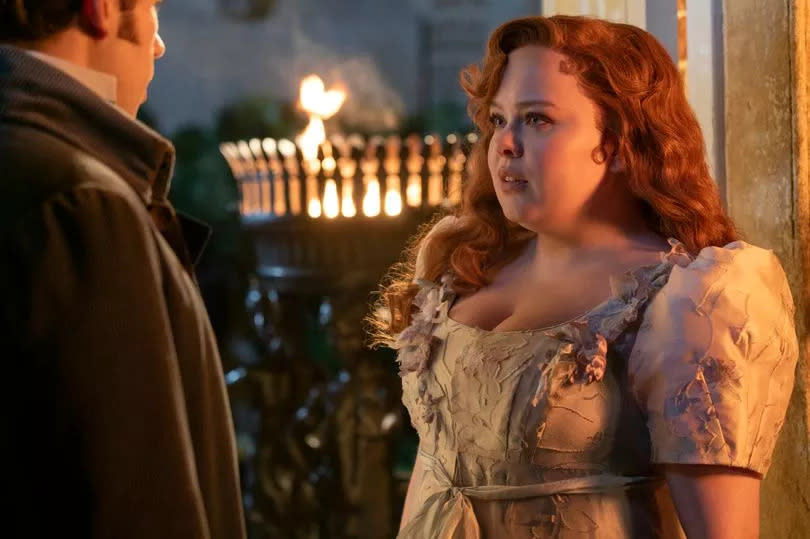Bridgerton lingo explained - Slang phrases used in the Netflix show from 'Modiste' to 'skied'

The latest instalment of Bridgerton has finally arrived on Netflix and viewers are already captivated! The first part of the third season of the much-loved Royal drama premiered on the streaming service today.
The new episodes focus on Derry Girls star Nicola Coughlan's character, Penelope Featherington, as she navigates her way through London's elite society. Penelope has finally moved on from her long-standing infatuation with Colin Bridgerton (portrayed by Luke Newton) after overhearing his unkind words about her in the previous season.
However, she has decided it's time to find a husband, ideally one who will allow her enough freedom to continue her secret life as Lady Whistledown. Meanwhile, Colin returns from his summer travels with a new look and attitude, but is disappointed to find that Penelope is avoiding him. Eager to regain her friendship, Colin offers to help Penelope build confidence to secure a husband.
However, when his lessons prove too successful, Colin is forced to question whether his feelings for Penelope are purely platonic, reports the Mirror. Not only are fans enamoured with Penelope and Colin's chemistry, the stunning dresses and fresh musical remixes, Bridgerton viewers are also engrossed in the Regency slang peppered throughout the episodes.
With the assistance of Preply, we've put together a list of classic Regency phrases you've likely heard while watching Bridgerton - and explained what they mean.
Being 'ruined'
This term might have crossed your ears once or twice during the show. As demonstrated by Daphne's shock when Simon first kissed her, being "ruined" refers to a young woman caught publicly snogging a man.
Rake
In today's dating scene, there are certainly some 'rakes' - and no, not the garden tools. Back in the 1810s, a 'rake' was defined as someone who lacked morals or values - the equivalent of a modern-day player.
The term originates from 'rakehell', a version of the Middle English word rakel, meaning "rash" and "hasty" quite similar to some fellas we know!
Promenade.
Forget a casual stroll in the park, back in the Regency era it was all about an elegant promenade.
The textbook definition of 'promenade' is "to conduct or display yourself as if you were in a parade". In other words, you may want to take a promenade with your soon-to-be other half to make your relationship official.
Fun fact: the word 'prom' originates directly from promenade.
Coming out
This term is a classic example of how meanings can change over time. Back in the 19th century, 'coming out' referred to a woman making her grand debut into society, typically at a special ball or party.
Doing this would also indicate that a woman was ready for courtship or marriage.
Trousseau
Coming from French origins, a "trousseau" is quite an ambiguous word. On one hand, it is perceived as a fancy word for underwear, while on the other, it is seen as an outfit of clothing fit for a bride.
Modiste
Before you even think about attending a Bridgerton-inspired ball, it's essential to have a word with your 'modiste'. A modiste is essentially a female dressmaker who not only tailors garments but also offers advice on what's stylish and suitable for different occasions.
Countenance
This elegant Regency term might sound grand, but its meaning is quite straightforward. Countenance refers to someone's facial expression.
Historically, maintaining one's countenance was all about keeping composure in the refined circles of polite society.
The social season
As depicted in the hit Netflix series Bridgerton, the social season is akin to an extended summer soiree in London, traditionally kicking off towards the end of March with a series of lavish parties running from mid-April until the waning days of June. Fast forward to 2022, and this tradition is still very much alive!
The ton
When you hear "the ton", think British high society. Sometimes mistaken for "town", this term actually denotes the upper echelons of the social hierarchy.
Originating from the French phrase "le bon ton", which means "etiquette" or "good manners", it's steeped in historical significance.
Skied
Back in the Regency era, if you heard something was "skied", it referred to walls lavishly covered with artwork, showcasing the opulence of interior design trends of the time....
In a scene where Benedict Bridgerton meets Sir Henry Granville, he makes a rather sharp comment about the artist's work, suggesting it ought to have been "skied". A rather harsh critique!
High in the instep
Describing someone as "high in the instep" suggests they possess an air of arrogance or haughtiness. This phrase fittingly encapsulates the depiction of British high society in the series, echoing through its narrative.
In the context of grand Regency banquets, "Courses" denotes a woman's menstrual cycle. Historical norms used the presence or absence of a woman's period as the determining factor to assess her fertility or pregnancy.
Since its premiere in 2020, Bridgerton has achieved monumental success; with the first two seasons spending an impressive 22 weeks combined in Netflix's global top 10. Furthermore, the series has spurred a limited prequel spin-off centred on Queen Charlotte and has teamed up with makeup giants such as Pat McGrath Labs and Kiko.
Bridgerton's third season will unfold in two segments. The first four episodes of part one premiered at 8am on Thursday, May 16, followed by the release of the remaining four episodes of part two at 8am on Thursday, June 13.
Exclusively available on Netflix, Bridgerton season three can be freely accessed with a Sky Stream free trial.
* A special thanks to Preply, a provider of online English tutors for private lessons, for assisting with the translations featured in this piece.

 Yahoo News
Yahoo News 
